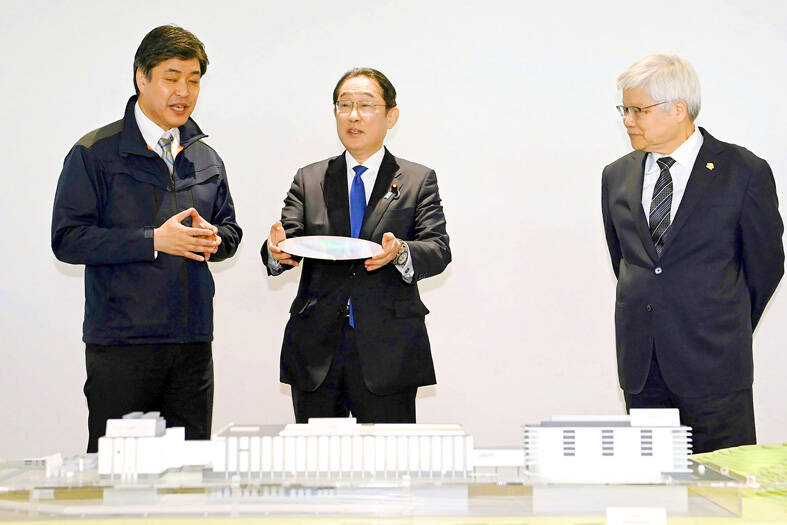Japanese Prime Minister Fumio Kishida yesterday visited a new semiconductor plant for which his government has pledged a support of more than ¥1 trillion (US$6.6 billion) to secure a steady supply of chips.
“I believe this project will have positive ripple effects throughout Japan. It is key for not only the semiconductor industry, but also a wide range of businesses such as electric vehicles and electronics,” he said while touring the facility.
The plant, located in the southwestern island of Kyushu, was opened in February and is Japan Advanced Semiconductor Manufacturing Company’s first in the country. It is majority owned by Taiwan Semiconductor Manufacturing Co (TSMC), the world’s largest contract chipmaker.

Photo: Kyodo News via AP
Japanese companies like Sony, Denso and Toyota are investing in the TSMC subsidiary, although the Taiwanese giant retained an 86.5 percent stake. The project underlines Japan’s hopes to regain its presence in the computer chips industry.
Four decades ago, Japan dominated in chips, with Toshiba and NEC controlling half the world’s production. That has since declined to less than 10 percent, amid competition from South Korean, US and European manufacturers, as well as TSMC.
Japan has recently earmarked about ¥5 trillion to revive its chips industry, seeking to become less dependent on imports, in the wake of pandemic-era shortages that affected auto production and other industries for months.
Ensuring an ample supply of the most advanced chips is vital with the growing popularity of electric vehicles, as well as artificial intelligence.
Private sector investment totals US$20 billion for the plants in the Kumamoto region of Japan. The second plant is set to be up and running in three years. The two plants are expected to create 3,400 high-tech jobs directly, TSMC said.
The plant is a bright spot for Kishida, whose popularity has plummeted amid a corruption scandal in his ruling Liberal Democratic Party.
Highlighting Japan’s ties with Taiwan and the US, its most important ally, is one way the prime minister can hope to boost flagging poll numbers.
Kishida is scheduled to meet US President Joe Biden in Washington next week.

An undersea cable to Penghu County has been severed, the Ministry of Digital Affairs said today, with a Chinese-funded ship suspected of being responsible. It comes just a month after a Chinese ship was suspected of severing an undersea cable north of Keelung Harbor. The National Communications and Cyber Security Center received a report at 3:03am today from Chunghwa Telecom that the No. 3 cable from Taiwan to Penghu was severed 14.7km off the coast of Tainan, the Ministry of Digital Affairs said. The Coast Guard Administration (CGA) upon receiving a report from Chunghwa Telecom began to monitor the Togolese-flagged Hong Tai (宏泰)

A cat named Mikan (蜜柑) has brought in revenue of more than NT$10 million (US$305,390) for the Kaohsiung MRT last year. Mikan, born on April 4, 2020, was a stray cat before being adopted by personnel of Kaohsiung MRT’s Ciaotou Sugar Refinery Station. Mikan was named after a Japanese term for mandarin orange due to his color and because he looks like an orange when curled up. He was named “station master” of Ciaotou Sugar Refinery Station in September 2020, and has since become famous. With Kaohsiung MRT’s branding, along with the release of a set of cultural and creative products, station master Mikan

RISING TOURISM: A survey showed that tourist visits increased by 35 percent last year, while newly created attractions contributed almost half of the growth Changhua County’s Lukang Old Street (鹿港老街) and its surrounding historical area clinched first place among Taiwan’s most successful tourist attractions last year, while no location in eastern Taiwan achieved a spot in the top 20 list, the Tourism Administration said. The listing was created by the Tourism Administration’s Forward-looking Tourism Policy Research office. Last year, the Lukang Old Street and its surrounding area had 17.3 million visitors, more than the 16 million visitors for the Wenhua Road Night Market (文化路夜市) in Chiayi City and 14.5 million visitors at Tainan’s Anping (安平) historical area, it said. The Taipei 101 skyscraper and its environs —

Taiwan on Friday said a New Zealand hamburger restaurant has apologized for a racist remark to a Taiwanese customer after reports that it had first apologized to China sparked outrage in Taiwan. An image posted on Threads by a Taiwanese who ate at Fergburger in Queenstown showed that their receipt dated Sunday last week included the words “Ching Chang,” a racial slur. The Chinese Consulate-General in Christchurch in a statement on Thursday said it had received and accepted an apology from the restaurant over the incident. The comment triggered an online furor among Taiwanese who saw it as an insult to the